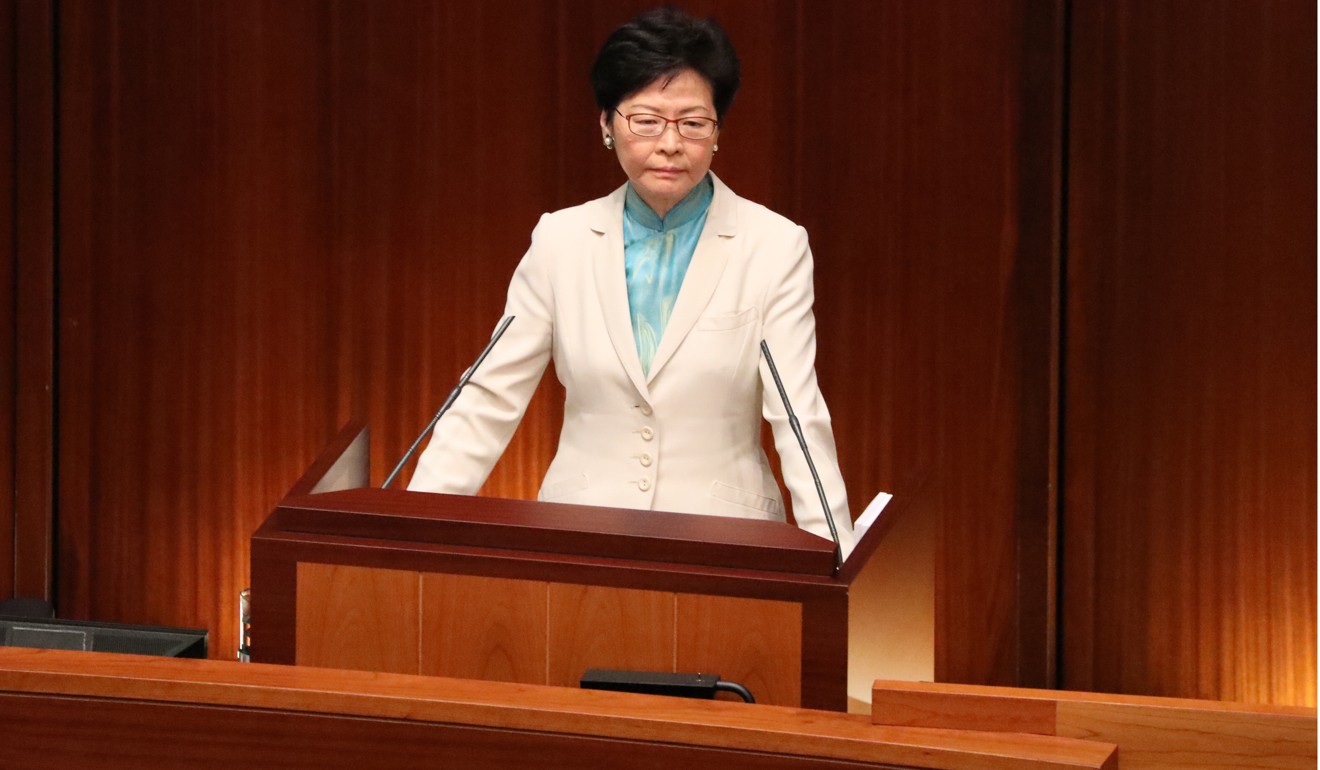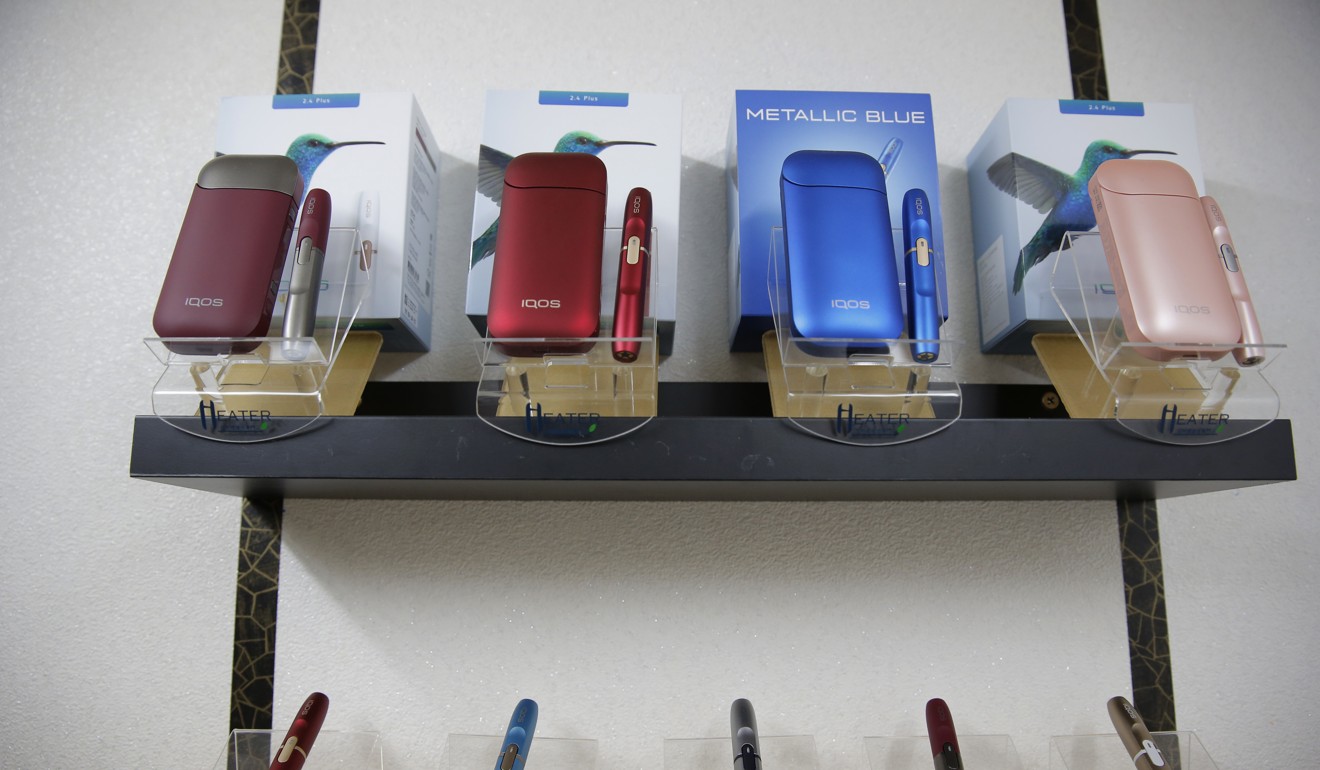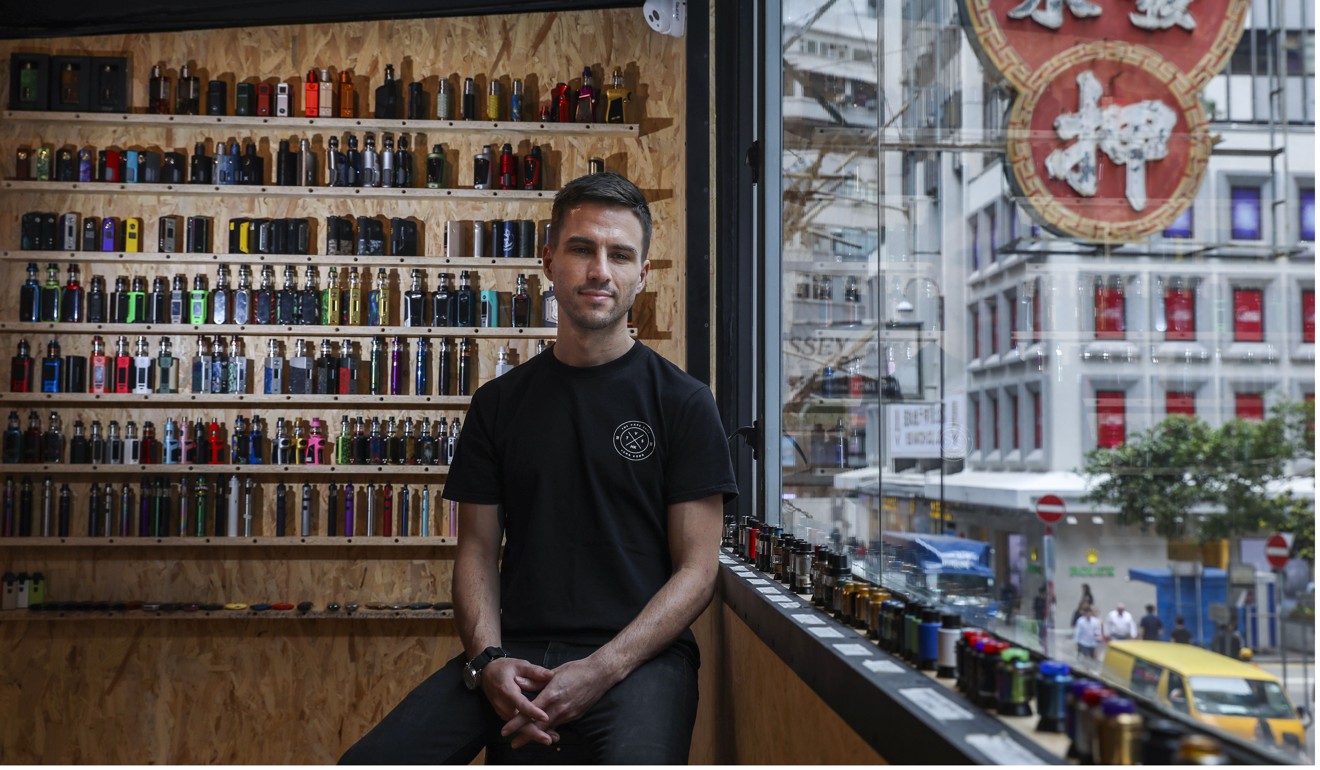
Hong Kong’s burgeoning e-cigarette industry on the precipice as city mulls total ban
- Business is brisk for wholesalers, manufacturers and retailers of vaping products, but it could all come crashing down as officials signal e-cigarettes may be outlawed
In just over two years Thomas McRae watched his business expand from an online shop to three stores in Kowloon and on Hong Kong Island.
He sells e-cigarettes, which have taken off in a big way in the city and worldwide in recent years.
The Hong Kong Vape Association, founded in 2015, now has about 100 members, covering around 50 shops, 20 wholesalers and 30 manufacturers of e-cigarette products.
The retail turnover is estimated at between HK$20 million (US$2.55 million) and HK$30 million a year. Hong Kong also re-exports e-cigarettes made in mainland China and this is said to be worth about US$10 million a month.
Business has been brisk and lucrative, but it may all fall apart if Hong Kong leader Carrie Lam Cheng Yuet-ngor goes ahead with her proposal to ban the import, manufacture, sale, distribution and advertisement of e-cigarettes as well as other new smoking alternatives.

In her policy address in October, Lam said these products were promoted as being less harmful than cigarettes and targeted young people and non-smokers, when in fact they led users eventually to smoking cigarettes.
Her threat to ban them was unexpected, because as recently as June the government was only considering suggestions to regulate their sale.
“I honestly didn’t believe they would ban it,” said McRae, 27, an Australian who moved to Hong Kong in 2015.
China aims to sell 6 billion cigarettes but tells people to quit smoking. What does it want?
Anti-smoking campaigners have long called for e-cigarette products to be outlawed, saying they are no less damaging to people’s health than cigarettes.
The World Health Organisation and US authorities have highlighted the dangers of e-cigarettes. Taking a hard line, Singapore banned the products last November.
As e-cigarettes have boomed into a multibillion-dollar industry worldwide, with hundreds of brands, the debate over their health risks has continued.

There have been claims that vaping – as using e-cigarettes is called – is less harmful than smoking, and that it may even help smokers quit their habit.
McRae, for one, swears that his health has improved since he switched from cigarettes to vaping.
Declan Kam, who opened an e-cigarette shop in Sham Shui Po in May, insists he wants to help smokers.
E-cigarettes ban stands to reason after study shows more Hong Kong primary school pupils are now vaping
“I decided to open this shop as I was told that e-cigarettes were less harmful than conventional cigarettes and could help people quit smoking,” he said.
They and others in the industry are now awaiting firm details of the government’s threat to impose a ban.
The discussion on curbing use has been going on since 2015, when the Hong Kong government first proposed the idea.

It is understood that despite being in favour of a total ban in 2016, former health chief Dr Ko Wing-man found it hard to move ahead after studies by related departments found implementation would be problematic.
A source familiar with the previous administration said there were two concerns, the main one being the impact on the livelihood of retailers.
“The government is not afraid of the big tobacco companies, despite their strong lobbies,” the source said.
The other concern was that some would respond to a ban by asking why conventional cigarettes were not being outlawed too.
The source said no country would be able to ban smoking, because the habit had existed for so long, and such a ban could affect the interests of tobacco companies, smokers and the advertising industry.

E-cigarettes work by heating a solution, which usually contains propylene glycol, flavourings, and sometimes nicotine. For “heat-not-burn” products, tobacco is heated by an electronic device rather than set alight.
Users of both types of products inhale the aerosol delivered through the devices.
If better health is the goal, banning vaping products and not cigarettes is illogical
A few years ago, e-cigarettes were found mostly in small shopping malls in areas such as Mong Kok and Causeway Bay, and cost between HK$100 and HK$500. Today, there are specialised shops in busy business areas including Tsim Sha Tsui.
McRae has seen a steady increase in customers. In September, he said, about 1,700 people visited his shops, up from about 300 a month when he opened his first store in 2016.
If the government goes ahead with the ban, all this will change.

“There will be no shops,” said McRae, who used to be a musician. “We would be forced to close.”
Max Chan Man-fai, chairman of the Vape Association, said the city’s retail market was small compared to the wholesale business and re-exporting to countries such as the United States and Britain.
He said the government had not made clear if its ban, if carried out, would extend to re-exporting e-cigarette products as well.
The Food and Health Bureau was unable to clarify whether re-exports would be affected when responding an inquiry from the Post.
Hong Kong’s ban on e-cigarettes is absurd. If vaping is as bad as smoking, why hasn’t tobacco been outlawed?
Chan said the impact on the international e-cigarette trade would be considerable if re-exporting was banned.
He said Shenzhen alone produced about 90 per cent of the world’s e-cigarettes and many mainland producers preferred to ship through Hong Kong.
Cui Tao, director of Innokin Technology, a Shenzhen-based e-cigarette manufacturer, said 60 to 70 per cent of the company’s exports went via Hong Kong to other countries, such as the US, Canada and Australia.
Cui said it would be a big blow to Shenzhen manufacturers if Hong Kong barred re-exporting e-cigarettes, as it would cost more and take longer to ship their products through mainland ports.
Gregory Conley, president of the American Vaping Association, a group which advocates for the industry, said Hong Kong was key to the e-cigarette trade between mainland China and the US.
America imported more than US$310 million worth of e-cigarette products from China, including Hong Kong, in 2016, according to a document from the US Government Accountability Office. That accounted for more than 90 per cent of e-cigarettes imported to the US that year.
Conley said if Hong Kong was not able to re-export those products, there could be higher prices and delays for American companies receiving them.
Nice job banning e-cigarettes, Carrie. Now for a total ban on all tobacco to show true grit
Similar problems could be expected in Britain, where the vaping market is worth about £800 million (US$1.03 billion) and has about 3.2 million vapers.
A spokeswoman for the UK Vaping Industry Association said: “We reckon a lot of those imports come through Hong Kong.”
But the debate over the risks posed by e-cigarettes shows no sign of abating.
Tobacco companies have been actively marketing their heat-not-burn products as potentially less harmful than cigarettes. Philip Morris Asia, which manufactures heat-not-burn products, claims its ultimate goal is to “replace cigarettes with better non-combustible alternatives”.
Public Health England, an executive agency of Britain’s Department of Health and Social Care, published a review in 2015 concluding that e-cigarettes were about 95 per cent less harmful than smoking. Its study has been cited often by vaping supporters.
McRae hopes there is still time to persuade the Hong Kong government that regulation is preferable to a ban.

“Their main concerns could be easily fixed with regulation,” he said.
But Dr Daniel Ho Sai-yin, associate professor of the University of Hong Kong’s School of Public Health, said the interests of businesspeople had not been considered by health experts in debates over smoking alternatives.
He said if a full ban were to be implemented, re-exports should also be banned to avoid any contradiction in policies.
Some medical groups, including the Hong Kong Academy of Medicine, the city’s two medical schools and the Medical Association, have been lobbying for a full ban on e-cigarettes and other smoking alternatives.
They say the products bring substantial harm to children and young people with new or unknown toxins.
A Hong Kong Baptist University study, commissioned by the anti-smoking group the Council on Smoking and Health and released in 2016, found harmful chemicals such as formaldehyde and polybrominated diphenyl ethers in e-cigarettes.
The US Centres for Disease Control and Prevention have said e-cigarette aerosol is not harmless water vapour, but could contain harmful substances such as cancer-causing chemicals and heavy metals such as nickel, tin and lead.
The WHO has said there is “no evidence to demonstrate that heated tobacco products are less harmful than conventional tobacco products”.
HKU’s Ho said other studies had already shown not only that e-cigarettes did not help smokers quit, but also that they increased the risk of heart attacks.
“Tobacco companies have earned a lot in the past, and the price has been the lives of hundreds of thousands of people. We don’t have to worry for those companies,” Ho said.
“What should be placed first is the health of the public rather than businesses.”

